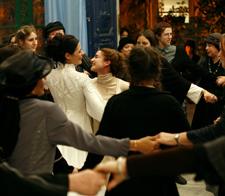
SUNSOAKED. Manu's friends take a walk at a beach house in the closing minutes of The Witnesses.
THE FIGHT TO CHOOSE
Stirring and poetic, XXY may prove to be one of the most enthralling, memorable films yet to appear at the Ottawa iteration of Inside Out.
“It is a very cruel world that divides things,” says director Lucia Puenzo. “We are men or women. Everything’s divided, binary.”
Tall with striking eyes, the accomplished (and surprisingly young) novelist-cum-filmmaker speaks passionately about the intersex struggle at the heart of XXY. “The people that fight for places in between have a very strong fight.”
Winner of the Critics’ Week Grand Prize Award at Cannes, XXY follows Alex (Inés Efron), a recalcitrant intersex teen whose burgeoning sexuality calls into question the female life she’s lived growing up.
Her parents, Kraken (Ricardo Darin) and Suli (Valeria Bertuccelli), are equally conflicted about her sexual identity and invite a couple and their young son, Álvaro (Martin Piroyansky), for the weekend.
Alex soon develops a crush on Álvaro, unaware that his father is a surgeon there to discuss the option of normalization (surgically operating on her to assign one gender).
The movie is adapted from the light-hearted short story Cinismo by author Sergio Bizzio. Puenzo, who is not intersex herself, decided the subject matter needed to be more dramatic after meeting with people like activist Alex Jurgen (from the famed doc Octopus Alarm).
“So what was happening to me when writing the draft was a bit of what was happening to Alex [Jurgen] in her real life. She was realizing that her path was not becoming a man but accepting the intersex,” says Puenzo. “Many people say if you are intersex you have to go to one side or the other but she was saying the identity was in the middle.”
Sexual identity has always interested Puenzo; several of the characters in her novels question their gender. In the research for her film, she ended up meeting with families who had gone through the process of normalization, as well as various intersex individuals.
“Those people have now become my close friends. I can see them and their everyday fight when we go out for lunch and the way people look at them,” she says. “They are fighting for that every day, in every action.”
XXY is no stranger to controversy. Various Catholic leaders walked out of a screening and condemned the film and its sex scenes outright — making it a big hit.
“It was a mega success in Italy thanks to them,” says Puenzo, smiling. “It was the best campaign they could do for me.”
Everyone from endocrinologists to intersex activists have weighed in on the film, some praising it for its anti-normalization stance, others objecting to the poetic license used in the title. (XXY is a chromosomal syndrome in men, not specific to intersexuality).
But Puenzo was more concerned with how her new intersex friends would react.
“I was very afraid. When I came back from Cannes I wondered what would happen. And they loved it. They have been the biggest supporters of the film.”
XXY is bolstered by stunning performances, and Puenzo took extra care casting Alex. As the story focusses on delicate and sometimes violent subject matter, the director settled on 23-year-old Efron to play the teenager.
“Everybody told me that she was not the right choice because she was very fragile and very feminine,” Puenzo recalls. “The character in the script was a tomboy and Ines was not that. I did a lot of rewriting because of that, because I knew that she was the one.”
Puenzo feels Alex’s struggle is more universal than it may seem.
“That moment when you are not a teenager anymore and you are choosing who you will be. Her being an intersexual is an example [of that] but I think that that fight applies to all of us at a specific point in our lives.”
In addition to a slew of awards, XXY has been released to date in more than 15 countries and has attracted an astounding attendance of 200,000 in its home country of Argentina. This has led to more education and openness about sexual ambiguity.
“The sexual activism, at least in my country, now is very strong,” says Puenzo. “They are fighting, fighting for the right to choose their name and their identity.”
—Mike Vokins
LETTING THE PUSSY OUT OF THE BAG
Badass schoolgirls — Jewish Orthodox-style! The Secrets is a sexy, riveting drama about two young women in a seminary whose taboo relationship is contrasted with their devotion to heal an older woman.
After the death of her mother, studious Naomi (Ania Bukstein) convinces her rabbi father to allow her to go to Safed to study in a seminary for women. Unhappily engaged to be married to the most repressive man ever, she eventually meets the gorgeous Michelle (Michal Stamler), fresh off the plane from France, cigarette in hand and full of rebellion. You know where this is going.
The unlikely pair get closer when they help a mysterious older French woman, Anouk (played by the indelible Fanny Ardent of 8 Femmes). Once imprisoned for murder, Anouk asks the girls to help her repent spiritually. Defying traditional law that states only men can administer rituals for atonement, the young girls surreptitiously perform the series of tikuns, uncovering disturbing things about Anouk’s past. At the same time, they discover hot, unsettling passions of their own.
Avi Nesher’s suspenseful film unfolds beautifully. The growing friendship is totally captivating and their rebellious adventures are exciting. There is a powerful feminist undertone to the story, particularly seen when one of Naomi’s teachers confides her dreams of one day seeing a female rabbi.
But this is Orthodox culture after all, and the ending for the two women is murky at best. Naomi and Michelle’s happiness in the final scene still alludes to the repression that women face in Orthodox society.
Secrets is a broad category for all things hidden in the film: lesbianism, murder, feminism, even SM. It’s tense storytelling and great actresses that really make the film a lush, unforgettable treat.
—Gordon Bowness
GOLDEN BODIES & BLACK COMEDY
Lovers Rey (Carlos Feuntes) and Leo (Pepon Nieto) are just a couple of average guys, working at average jobs, putting on weight and being in love in their grungy apartment in the heart of Madrid. When their neighbour, an elderly Spanish woman, is murdered, the two become the central characters in a plot to turn their little neighbourhood into a gay paradise — by whatever means necessary. To complicate matters further, Rey’s mother Antonia (Concha Velasco) moves into the deceased Rosa’s apartment, and firmly wedges herself between her son and Leo in an all-out war of bitchiness and name-calling.
Boystown is replete with a cast of characters who are both hilarious and endearing, including a mother-and-son detective team with more collective neuroses than a psychiatric ward, a driving instructor with a hard-on for Rey’s older mother, and a host of other in-and-out weirdos who occasionally grace the scene. Rey and Leo have an open relationship, and in the midst of their insecurities, that causes jealously and unhappiness— and is the impetus for a lot of well-acted sexual tension.
While clever, the movie’s strengths are at times its weaknesses. With so many quirky characters floating around, the constant campiness is almost too much to handle. Likewise, the plot is contrived, utterly unbelievable in places, and the villain — a well dressed, sleek, young gay realtor named Victor (Pablo Puyol) — looks like he might fit in better in a silent film, tying a woman to train tracks, than walking about the modern-day streets of Spain. While the movie is hilariously funny in some places, it occasionally takes the darkness of the comedy too far. There are a few particularly disturbing scenes, including the microwaving of a cat and the hanging of an elderly woman, none of which are at all funny or consistent with the vibe of the rest of the film.
Boystown straddles the strained relationships between gays and straights, the young and the elderly, open and closed romances, mothers and sons, the beautiful and the merely average. It exists in a weird no-man’s land somewhere between a gay love story and a murder narrative and blends the traditions of European drama and North American black comedy. Really, really, black comedy.
—Lorianne Garrison
SPECTATOR SPORTS
A young man and an older companion become unlikely friends in André Téchiné’s Le Témoins (The Witnesses).
Manu (the irresistible Johan Libéreau) arrives in Paris from the countryside. He heads directly to the gay stroll, where he picks up an admirer, an older doctor named Adrien (Michel Blanc). After Adrien introduces Manu to his straight friends Mehdi and Sarah (Sami Bouajila and Julie Depardieu), Manu seduces the husband and befriends his writer wife. As Manu grows sicker with a mysterious illness (hint: the film is set in the early ’80s), it’s Adrien and Sarah who are left to witness his unravelling.
Witness, indeed. Witnesses are both bystanders and voyeurs, after all. But “witness” also means, “one who gives testimony,” both in the Christian sense and the legal one. When after the funeral, Manu’s sister, an opera singer, says “I spent the whole day thinking about my voice; I hardly thought of Manu at all,” what kind of a witness is she?
Téchiné is at his most compelling with the conflicted Mehdi. He’s a police officer and Paris is cracking down on gays in the parks, bathhouses and brothels. Mehdi is unmoved by his contradictions, but then, The Witnesses is filled with European ambiguity.
—Marcus McCann
TEENAGE PARIAH
Opening with a dizzying array of visceral sexuality and music, Pariah is a short film which questions the reality of one lesbian’s identity in the face of persecution from her family and the society around her. Set in a black, middle class neighborhood in New York City, Alike (Adepero Oduye) is a 17 year-old lesbian living with her Christian parents and dealing with the everyday ins and outs of being a teenage girl — love, family and self — set against a backdrop of religious intolerance. Alike struggles to maintain her dual identities as a strong lesbian woman and a “normal” teenage girl with the support of her out-of-the-closet best friend Laura (Pernell Walker).
While a poignant, intelligent and well acted drama, the film’s short run time (29 minutes) makes the plot move so rapidly, without time to flesh out the characters, that the film loses some of the intensity that it attempts to convey. The film is actually a shorter version of a feature-length work also by creator Dee Rees.
Pariah was selected for the 2008 Sundance Film Festival and has one several awards, including Best Short Film at the Outfest LGBT Film Festival and the Audience Award at the Los Angeles Film Festival in 2007.
Catch Pariah and nine other short films at SAW Gallery on the closing night of the fest.
—Lorianne Garrison

 Why you can trust Xtra
Why you can trust Xtra


